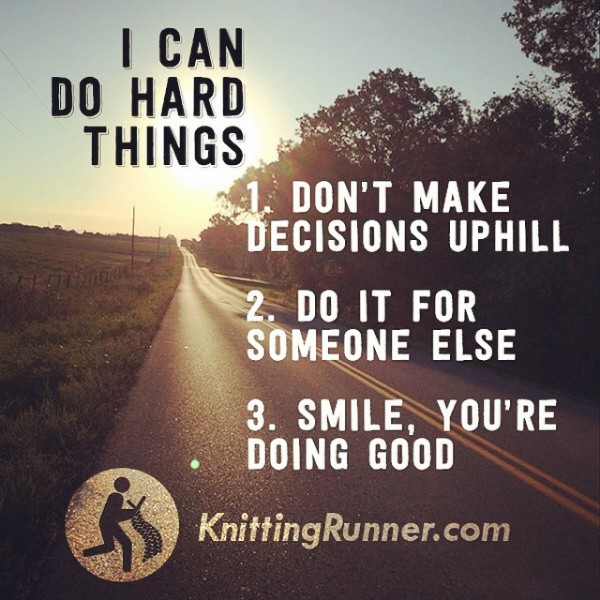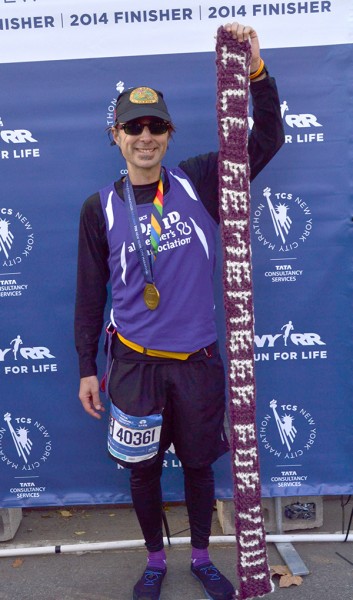This week David wants to know – what do you find hard? Keep reading …
Lion Brand is sponsoring David Babcock, aka the Running Knitter, in not one but TWO marathons this fall! David is running to raise money for Alzheimer’s research and he needs your support – please donate today.
David is the Guinness World Record holder for knitting the longest scarf (over 12 feet!) while running a marathon, which he accomplished in 2013. In Kansas City on October 17th, he will attempt a second world record – the largest doily crocheted while running a marathon! Last year David ran the New York City Marathon in under four hours, setting a personal record while finger-knitting a scarf with the words, “I’ll remember for you.” Together, David and Lion Brand raised just under $10,000 for the Alzheimer’s Association, New York City Chapter and we’re going to do it again this year!
The Knitting Runner’s Training Diary Part #2
I’m training again for a marathon. Yes, it is hard. Like most people, I would rather be comfortable = not running. So why do something hard and uncomfortable? Short answer: because I can and it matters, plus it’s good to do hard things.
I like to find parallels between my running, learning more about yarn arts, and life. So while you may not be marathon training chances are that, as a visitor to this site, you are trying to improve your yarn skills. It is also safe to assume that most people are dealing with something hard in their life.
To keep myself motivated and moving I keep telling myself, “I can do hard things”. There are three key parts to this that I would like to share with you.
The worst time to decide to slow down, or quit, during a race is when it is toughest while you are running uphill. Make decisions when you are stable, cooling off, or at a rare resting point. Don’t decide when your knitting is knotted or your crochet is crooked. Frustration and despair are what we are training against.
I’m running races while doing crochet this year to raise funds and awareness for Alzheimer’s and caregivers. If it was just me it would be easier to sleep in. I’m doing it for them and they are counting on me. Find a creative way to connect with a cause. Most hard things find you. If you are caring for someone with Alzheimer’s Disease they might not thank you. Don’t confuse someone’s appreciation for service with the value of that service. For your yarn projects it helps to find a recipient with a good sense of humor. Pets tolerate less-than-perfect projects as well as they do successful ones.
It is hard to look good in a marathon race photo. Being positive and hopeful about your efforts is like a turbo boost. Smiling is not a way to hide your pain but a way to invite others to share the load. If your hard things are for someone you love let that love lift you up. Hard is important. It is how we get things done that matter. The things that do the most good are often the hardest. Does being better with your yarn really matter? Make it matter by connecting it with other people.

The Alzheimer’s Association uses flowers as a symbol for remembering our relationships with those affected by Alzheimer’s Disease. For the NYC Marathon I’ll be making finger-crochet flowers while running. I’ll be making lots of flowers as I train. Everyone deserves a flower but I won’t be able to manage that but I can give away a few. Last year I shared training scarves with randomly selected readers who shared a story about their relationship to Alzheimer’s and yarn arts.
This year I’d like to hear about the hard things that you can do, leave your message in the comments below. It doesn’t have to be connected to yarn but we are all connected here through our yarn. I think you are awesome for working hard and working through it. You are becoming more talented, stronger, more able to serve, and more able to love. You deserve a flower and much more.
– David Babcock, the Knitting Runner

David Babcock ran the 2014 NYC Marathon in 3:56 (a PR) and raised just under $10k for Alzheimer’s research.
Sandy Koehn
I have COPD. I am training to walk a 5k next spring. I carry an 11 lb backpack containing my portable oxygen. I am determined to do this in memory of my niece who lost her life to Breast Cancer in 2013 and my husband who lost his battle with Kidney Cancer in 2014.
David Babcock
Sandy, you are awesome! Your love will keep you moving. Your example is doing good things for me along with serving your niece and husband. I’m cheering for you.
Lori Buswold
I am recovering from the side effects of breast cancer while working a weight loss program to go from 400lbs to 160. I started Aug.24, and have lost 32lbs so far! Life changes to improve my chances of being around to see my 19, 16, 14 and 8 year old grow up!
David Babcock
You are a survivor Lori! You can do it for your children.
Lori Buswold
Thank you for beliving in me! By next year at this time, I will have improved my bone strength enough to ditch the forearm crutches, and intend to do the Susan G Kolman 3 day walk!
jacqui Knowles-Bell
The hardest thing I had to do. My funny active caring Dad had been ill on and off for 2 years, he was 84 when dementia began it’s cruel countdown. He knew he had it and hated it. He put a DNR on his records. When he finally got to the point where no more could be done for him, myself and brother and sister had to agree to the DNR. He wanted release from the dementia, but even so it was the hardest thing to do. My vibrant funny Dad gone, my world. My mother is in a home now with Alzheimers. I am planning to do a yarn bomb to raise awareness for all memory problems. I’m a foster carer to a boy with severe memory problems. He struggles to learn and can not go out on his own and probably never will. But we have great fun and he says he will be with me for ever whilst I do my knitting. So I am now scouting my home town in Felistowe, England for a good place and project for a yarnbomb. Maybe a snowman in the town centre.
David Babcock
Jacqui, you’re right, letting go is hard. Dementia is very cruel in the way that it robs us of the people we love even when they are still here. You are helping that boy to build a life. Make sure he knows that men knit too. I love the snowman idea. Be sure to include others and get their help. Hard is best shared and I believe that there are people looking for a way to help. Look up Susie Hewer in England she is my dementia-fighting hero.
Maria Irene Torres
So nice what you do! I’ve walked a 5k while crocheting a square. It took me 1hr to complete the 5k but I decided to start and finish crocheting in the same place, to measure the time: 8hrs non stop crocheting a traditional granny square just for the pleasure of it.. Now I’m about to start training again and I’m planning to do a blanket with the squares I do while on a 5k.. (and of course,couple scarfs for winter time 🙂 )
David Babcock
Maria, a walking granny square sounds silly, fun, and hard. I like it. There is pleasure in doing things that don’t come easy. I have yet to do my own grampy square. I’m looking forward to wearing a scarf that I made out of season.
DonnadB
Really helpful advice, David — thank you. My hardest thing is helping my autistic son get ready for independence. I want to protect him, but I need to let him do hard things, even risk being hurt, so he can grow. It’s not that different from what any parent goes through, except I have to fight my own tendency to use his autism as an excuse. Next week I’m going to commit to allowing him to go on a multi-day out-of-state choir trip, and that’s going to be really hard for me thinking about all the problems he might encounter, but I know I need to do it.
David Babcock
Donna, yes, parenting is hard. At one point in my life my mother decided to pray and trust that someone near me could help me where she couldn’t because she was too far away. Your son will continue to find kind, helpful, and patient people near him as you continue to reach out to others within your range. Autism is definitely an uphill race but he isn’t running it alone and I believe that your trust and confidence in him will make him stronger.
Kit
I am learning to walk again after injuring my knee for what feels like the 92nd time (lost count a long time ago). I will probably always be on crutches now, too many injuries to get off them without total knee replacement in both knees and probably not even then. But I can be active and involved in the stuff I love on crutches, and so I am okay with that. But right now my knee is bad enough that I cannot get very far even with crutches right now. Some days I need to use a walker it instead, and some days I need a manual wheel chair. A lot of people ask me why I don’t get an electric wheel chair or a scooter. I tell them, because if you get an electric wheel chair or a scooter, it is too easy to give up on walking again. I am never going to make it easy for myself to give up walking. As long as I have my legs, I will walk again, and if I ever lose my legs I will still find a way to try to walk again. I am 64 years old, and I am going to college on line to learn new work that I can do within my physical limitations. Sometimes the hardest part is acknowledging my limitations. I have always been a very active and physical person, even when I have been hurt. I have walked two 5ks on crutches, and the support I got from other walkers was wonderful. But what was even more wonderful was being an inspiration to others to keep going. In each event I would hear people say things like, “Look, she is doing it on crutches! If she can do it, we can finish it also.”
Winston Churchill said, “Never give up!”
David Babcock
Kit, being able to inspire others is a great reason to not give up. I hope your body will cooperate with your unconquerable spirit.
Kit
So far, my body has done some pretty amazing recovery, which probably helps me be optimistic and keep going when the way ahead is long and painful.
I think I have followed all three of your suggestions, too, even before I heard about you, although I never heard the first suggestion put in those words. The best way I had heard it put before was along the lines of “When you are up to your elbows in alligators, don’t forget that your objective is to drain the swamp. Yours is a much clearer way of putting it.